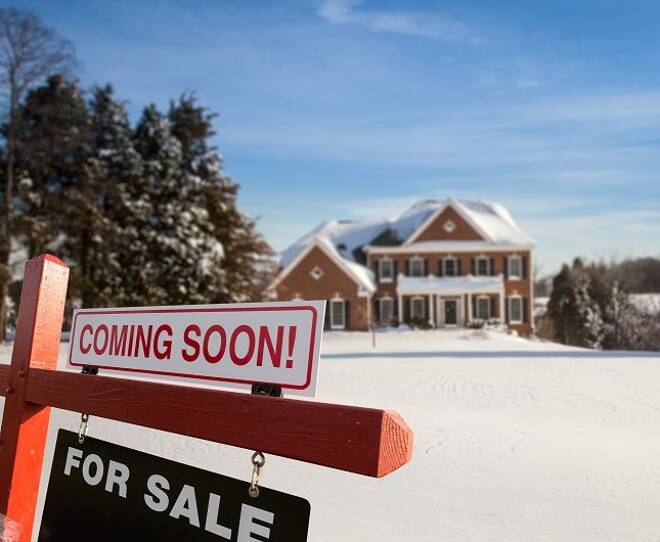Advertisement
Advertisement
U.S Mortgages – Mortgage Rates Hit Reverse Once More
By:
Mortgage rates fell to levels not seen since April of last year, as concerns over the U.S - China trade talks hit risk sentiment.
Mortgage rates reversed the previous week’s first weekly rise in 12-weeks in the week ending 7th February. 30-year fixed rates decreased by 5 percentage point to 4.41%, according to figures released by Freddie Mac.
The continued downward trend in mortgage rates since mid-November has seen mortgage rates to slide back to levels not seen since April of last year. 30-year fixed rates had peaked at 4.94% in mid-November.
This is yet more good news for prospective home buyers in particular. While mortgage rates have gone full circle, inventories have seen an uptick, with house price growth has slowed. The combination has provided prospective buyers with greater choice and ultimately greater bargaining power.
Economic data has yet to reflect a material slowdown in the U.S economy, with labor market numbers continuing to impress. Throw in a possible pause in rate hikes by the FED and it could be a particularly soft landing for the real estate sector.
Economic Data from the Week
Economic data released through the week was on the lighter side. Key stats were limited to November factory orders, January service sector PMI numbers, November trade data, and weekly jobless claims numbers.
Disappointing factory order numbers and a softer than expected ISM non-manufacturing PMI were negatives, supporting the FED’s more dovish stance on policy, while the November trade deficit narrowed for the first time in 5-months, a positive for the Dollar and Trump, who continues to wage the trade war.
The stats came off the back of impressive nonfarm payroll figures that had been released the week prior.
Outside of the numbers, Trump’s State of the Union speech failed to ruffle the market’s feathers. The U.S President did raise doubts, on Thursday, over whether a trade agreement between the U.S and China would materialize before a scheduled rollout of fresh tariffs at the beginning of March.
Downward revisions to growth by the ECB on Thursday and Trump’s pessimism weighed on risk sentiment, pinning back Treasury yields, with the global equity markets also hitting reverse.
Freddie Mac Rates
The Weekly average rates for new mortgages as of 7th February were quoted to be:
- 30-year fixed rates fell by 5pp to 4.41% in the week. Rates were up from 4.32% from a year ago. The average fee decreased by 0.1 points to 0.4 points.
- 15-year fixed rates fell by 5pp to 3.84% in the week. Rates were up from 3.77% from a year ago. The average fee remained unchanged at 0.4 points.
- 5-year fixed rates also fell by 5pp to 3.91% in the week. Rates increased by 34pp from last year’s 3.57%. The average fee held steady at 0.3 points.
Mortgage Bankers’ Association Rates
For the week ending 1st February, rates were quoted to be:
- Average interest rates for 30-year fixed, backed by the FHA, decreased from 4.77% to 4.70%. Points decreased from 0.58 to 0.57 (incl. origination fee) for 80% LTV loans.
- Average interest rates for 30-year fixed with conforming loan balances decreased from 4.76% to 4.69%. Points decreased from 0.47 to 0.45 (incl. origination fee) for 80% LTV loans.
- Average 30-year rates for jumbo loan balances decreased from 4.60% to 4.50%. Points increased from 0.24 to 0.28 (incl. origination fee) for 80% LTV loans.
Weekly figures released by the Mortgage Bankers Association showed that the Market Composite Index, which is a measure of mortgage loan application volume, fell by 2.5% in the week ending 1st February. The decline comes off the back of the previous week’s 3% fall.
The Refinance Index rose by 0.3% in the week ending 1st February. The rise follows a 6% decline from the previous week.
The share of refinance mortgages decreased from 42.0% to 41.6%. The fall follows the previous week’s decrease from 44.5% to 42.0%.
According to the MBA, purchase applications continued to fall in spite of mortgage rates hitting the lowest levels since April of last year. Purchase applications were 2% lower than a year ago, while refinance applications saw just a moderate rise despite the fall in rates.
The MBA also released its Mortgage Credit Availability Report for January.
According to the MBA, the mortgage credit availability index (“MCAI”) increased by 2.3% to 179.0 in January.
- The Conventional MCAI increased by 4.9%.
- The increase was attributed to the Conventional and Conforming component MCAIs which rose by 7.3%, while the jumbo MCAI increased by 3.0%.
- The Government MCAI remained unchanged.
For the week ahead
Economic data is on the heavier side. Key stats include December’s JOLTs job openings, January inflation figures, business inventory numbers, and wholesale inflation numbers. Retail sales figures will also be in the spotlight.
While we will expect the stats to have an influence on market risk appetite and Treasury yields, sentiment towards the global economy and U.S – China trade talks may ultimately have the last say on U.S Treasury yields. China returns from a week off, in celebration of Chinese New Year and there may well be plenty of activity in the week ahead.
About the Author
Bob Masonauthor
With over 28 years of experience in the financial industry, Bob has worked with various global rating agencies and multinational banks. Currently he is covering currencies, commodities, alternative asset classes and global equities, focusing mostly on European and Asian markets.
Advertisement
